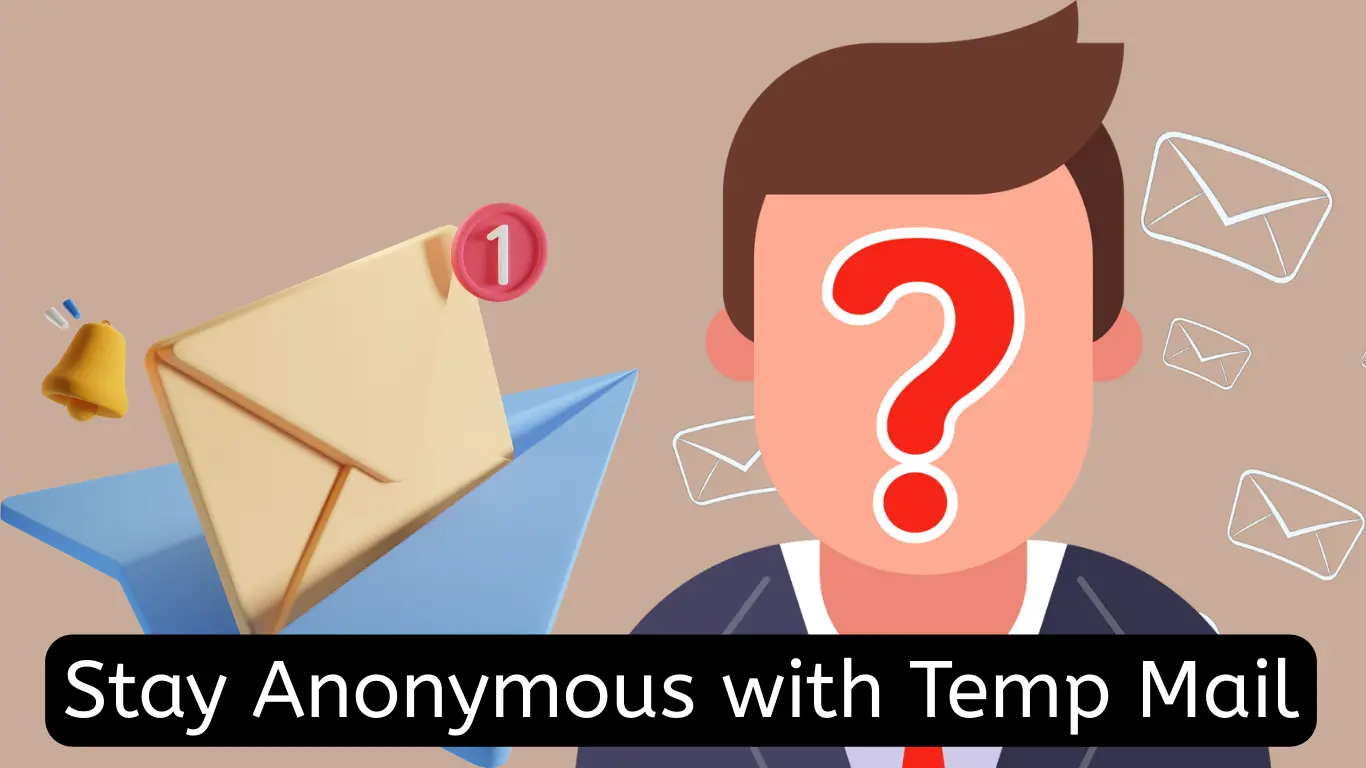

How to Stay Anonymous Online Using Temporary Email
In today’s hyper-connected digital world, anonymity has become one of the most valuable assets you can protect. Every time you go online—whether you’re scrolling through social media, shopping, or simply searching for information—your digital footprint is being tracked. Many websites collect user data either with consent or silently in the background. Some of this information may be harmless, but when aggregated, it can paint a detailed picture of who you are.
The problem? That same information can be exploited for purposes you never agreed to. From intrusive advertising and spam to denied loans and even government surveillance, your personal details may be used in ways that affect your finances, career, and personal life.
This article explores why staying anonymous online is essential, what threats exist, and how you can protect your identity with effective, practical solutions.
Why Is Online Anonymity Important?
At first glance, it might seem unnecessary to hide online. After all, if you’re not breaking the law or doing anything “suspicious,” why should you care? The truth is, online anonymity is about protecting your personal freedom and safeguarding your private information, not hiding criminal activity.
Here are some key reasons why anonymity matters:
1. Protection from Targeted Ads
Advertisers build extensive user profiles based on your browsing history, searches, and clicks. This information is then used to deliver hyper-targeted ads. While some people consider this “convenient,” it is essentially behavioral manipulation designed to influence your decisions.
2. Avoiding Data Misuse
Collected personal data may end up in the wrong hands. For instance, data brokers often sell user information to third parties. This can result in spam emails, robocalls, or even scams targeting you specifically.
3. Preventing Discrimination
Employers, landlords, or financial institutions may use your online behavior to make decisions. A history of certain searches or activity could lead to loan rejections, higher insurance rates, or missed job opportunities.
4. Defending Against Government Surveillance
Many governments worldwide collect online data under the pretext of national security. While some surveillance is legal, it often crosses into what people view as an invasion of privacy.
5. Protecting Your Personal Safety
For journalists, activists, or individuals in sensitive situations, staying anonymous online can be a matter of safety. Revealing too much online can put people at risk of harassment, stalking, or even physical harm.
The Most Popular Ways to Stay Anonymous Online
Maintaining online privacy is not impossible—it just requires awareness and the right tools. Below are proven methods to stay anonymous and reduce your digital footprint.
1. Use a VPN (Virtual Private Network)
A VPN is one of the most effective tools to protect your identity. It encrypts your internet connection and routes your traffic through a secure server, hiding your IP address and location.
Benefits of a VPN:
- Full confidentiality of your browsing activities
- Bypass geo-restrictions and access blocked websites
- Secure data transfers, especially on public Wi-Fi
- Protection against ISP (Internet Service Provider) tracking
Many VPNs are available today—some free, some paid. Free options like Privatix.com can provide a starting point, but premium services such as NordVPN, ExpressVPN, or Surfshark offer stronger encryption, faster speeds, and better customer support.
Pro Tip: Always choose a VPN with a no-logs policy to ensure your browsing activity isn’t recorded.
2. Switch to Privacy-Focused Search Engines
Search engines are one of the biggest privacy threats because they log every search query, click, and sometimes even keystrokes. This data can be tied back to you even when using a VPN.
Alternatives:
- DuckDuckGo – Doesn’t store personal information or search history.
- Startpage – Fetches Google results but removes tracking identifiers.
- Qwant – A European search engine focused on user privacy.
By switching your default search engine, you can instantly reduce how much personal data is collected about you.
3. Configure Your Browser for Privacy
Your browser is like a window into your digital life. By default, many browsers leak information through cookies, trackers, and fingerprints.
How to strengthen browser privacy:
- Use privacy-focused browsers like Brave or Firefox.
- Install extensions like uBlock Origin, Privacy Badger, and HTTPS Everywhere.
- Block third-party cookies and disable location tracking.
- Regularly clear browsing history and cache.
- Use incognito or private browsing modes when necessary.
Pro Tip: For maximum privacy, consider using the Tor Browser, which routes your traffic through multiple servers worldwide, making tracking extremely difficult.
4. Use Anonymous Email Services
Your email address often acts as your online identity. Using the same email across multiple platforms makes it easy for companies, spammers, and even hackers to connect your activities.
Solutions:
- Create multiple email accounts for different purposes (work, shopping, personal).
- Use temporary or disposable email services like Temp Mail.
Temp Mail Features:
- Instant anonymous email generation
- No personal registration required
- Ability to change addresses at will
- Unlimited usage until you delete the inbox
- Keeps your primary inbox safe from spam
This way, you can sign up for online services without revealing your real identity.
5. Limit Social Media Exposure
Social media platforms are some of the largest collectors of personal data. Every like, share, and comment adds to your digital profile.
Tips to stay anonymous on social media:
- Use pseudonyms or nicknames instead of real names.
- Avoid sharing personal information like your location, phone number, or workplace.
- Turn off location tracking and facial recognition features.
- Regularly review and adjust your privacy settings.
- Be cautious when accepting friend requests from strangers.
Remember, once something is posted online, it’s nearly impossible to remove it completely.
6. Encrypt Your Communications
If you often discuss sensitive topics online, consider using encrypted messaging services.
Best Options:
- Signal – End-to-end encrypted messaging with no data storage.
- ProtonMail – Secure email with strong encryption.
- Telegram (Secret Chats) – Offers end-to-end encrypted conversations.
Encryption ensures that even if someone intercepts your communication, they cannot read its content.
7. Practice Safe Digital Habits
Technology alone cannot protect you—you also need good online habits.
Best practices for anonymity:
- Avoid using the same username across multiple platforms.
- Be mindful of the information you share publicly.
- Do not click on suspicious links or attachments.
- Regularly update your software and devices for security patches.
- Use strong, unique passwords and enable two-factor authentication (2FA).
Challenges of Staying Anonymous Online
While the methods above can drastically improve your privacy, achieving complete anonymity is very difficult. Governments, corporations, and cybercriminals are constantly developing new methods to track users.
Some challenges include:
- Websites using browser fingerprinting to identify unique users.
- Increasing reliance on cloud services that require identity verification.
- Data collection through mobile apps that request unnecessary permissions.
Despite these challenges, taking active steps towards anonymity makes you a harder target and gives you more control over your online identity.
Frequently Asked Questions (FAQs)
1. Is it legal to stay anonymous online?
Yes. Using tools like VPNs, encrypted messaging, and anonymous email is legal in most countries. However, some nations restrict VPN usage, so always check local laws.
2. Can I be completely anonymous online?
Complete anonymity is nearly impossible due to advanced tracking methods. However, you can significantly reduce your digital footprint and make tracking extremely difficult.
3. Are free VPNs safe?
Free VPNs may work for basic needs but often come with limitations, slower speeds, and sometimes questionable privacy policies. Paid VPNs generally offer better protection.
4. What is the best anonymous search engine?
DuckDuckGo and Startpage are among the best. They don’t store search histories or personal information.
5. How do I stop spam emails permanently?
Using disposable email services like Temp Mail for sign-ups is the most effective way. For your primary email, use strong spam filters and avoid sharing it publicly.
6. Is Tor better than a VPN?
Tor provides stronger anonymity but can be slower. A VPN offers faster, encrypted connections. For maximum security, some people use Tor over VPN
Conclusion
Staying anonymous online in 2025 is no longer optional—it’s a necessity. Whether it’s advertisers tracking your behavior, companies selling your data, or governments monitoring citizens, the risks to your privacy are real.
By using VPNs, privacy-focused search engines, secure browsers, anonymous email services, and smart digital habits, you can protect yourself from surveillance, spam, and exploitation.
Anonymity is not about hiding—it’s about defending your right to privacy, freedom, and security in a digital world that never stops watching.

